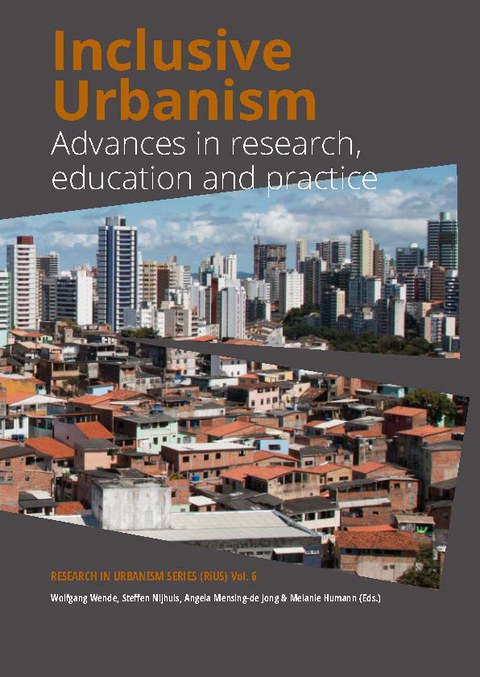08.10.2020
Eine Stadtplanung für die Bewohner: Neues Open-Access-Buch „Inclusive Urbanism“ widmet sich großen Fragen der Stadtentwicklung weltweit
Mehr als die Hälfte der Weltbevölkerung lebt in Städten. 2050 werden es laut einer Prognose der UNO rund zwei Drittel sein. Mit der fortschreitenden Urbanisierung werden soziale Fragestellungen in der Stadtentwicklung immer drängender. Die TU Dresden hat nun gemeinsam mit der Abteilung Urbanism der TU Delft und dem Leibniz-Institut für ökologische Raumentwicklung Dresden (IÖR) das frei verfügbare Buch „Inclusive Urbanism“ veröffentlicht, das sich den großen Fragen der Stadtentwicklung widmet – auf lokaler Ebene wie im globalen Kontext. Die Publikation ist ein Ergebnis der Kooperation zwischen der TU Dresden und der TU Delft und wird herausgegeben von Wolfgang Wende (TU Dresden), Steffen Nijhuis (TU Delft), Angela Mensing-de Jong and Melanie Humann (beide TU Dresden).
„Im Mittelpunkt der Stadtentwicklung stehen heute nicht mehr einzelne spektakuläre Gebäude. Vielmehr geht es um das gesellschaftliche Miteinander und Teilhabe“, erklärt Mitherausgeber Prof. Wolfgang Wende, Professor für Siedlungsentwicklung an der TU Dresden und Leiter des Forschungsbereiches Wandel und Management von Landschaften am IÖR. „Städte und Siedlungen inklusiv, sicher, widerstandsfähig und nachhaltig zu gestalten, gehört zu den wichtigsten Aufgaben und ist zudem Ziel für nachhaltige Entwicklung der Vereinten Nationen. Die Frage, wie sich Städte einerseits an die Folgen des Klimawandels anpassen und anderseits im Sinne des Klimaschutzes nachhaltiger und sozial ausgewogener entwickeln können, steht dabei über allem.“
Soziale Fragen und Partizipation – lokal und global
Von Dresden–Hellerau nach São Paulo: Die brasilianische Wissenschaftlerin Alexandra Aguiar Pedro untersuchte im Dresdner Stadtteil Hellerau das interkulturelle Urban-Gardening-Projekt Golgi-Park. Unter den richtigen Voraussetzungen können solche Initiativen wertvolle Integrationsarbeit leisten und Menschen soziale Teilhabe ermöglichen. Die Erkenntnisse nutzt die Forscherin und Stadtplanerin nun, um in mehreren Favelas in ihrer Heimatstadt São Paulo ein ähnliches Urban-Gardening-Projekt aufzubauen.
Das Thema ist nur eines von mehreren praxisorientierten Beiträgen des neuen Buches. Gleich mehrere Artikel beschäftigen sich mit der Partizipation der Bevölkerung an Planungsprozessen und entwerfen alternative Szenarien zu einer Stadtentwicklung „von oben“. Hier wird der Bogen gespannt von einer deutschen Kleinstadt, in der die Beteiligung von Jugendlichen erprobt wird, bis zu den neuen Megastädten in Afrika, wo gemeinsame Workshops von Planern und Bewohnern für mehr Inklusion im Sinne einer gerechten Teilhabe sorgen sollen. Sogenannte informelle Siedlungen, die nicht nur im globalen Süden in Form riesiger Slums existieren, sind heute nicht mehr nur negativ konnotiert. Vielmehr erkennen Planerinnen und Planer die Chancen der spontanen Urbanisierungsprozesse und suchen nach Möglichkeiten, die Menschen in ihrer Selbstorganisation zu unterstützen.
Open Access – Mehr Teilhabe an wissenschaftlichen Erkenntnissen
Die Stadtentwicklung selbst wird inklusiver und partizipativer, ebenso die Wissenschaft. Daher war es den Herausgebern wichtig, das Buch im Open Access weltweit frei und kostenlos verfügbar zu machen. Download-Link: https://doi.org/10.7480/rius.6
„Inclusive Urbanism“ wurde in der Reihe „Research in Urbanism“ (RiUS; www.rius.ac) veröffentlicht. RiUS ist eine Open-Access-Publikationsreihe der TU Delft, Fakultät für Architektur und gebaute Umwelt. „Inclusive Urbanism“ enthält ausgewählte Beiträge der internationalen Konferenz „Urban Studies in Education and Research“, die Ende 2018 an der TU Dresden stattfand.
Wende, W.; Nijhuis, S.; Mensing-de Jong, A.; Humann, M. (Eds.) (2020). Inclusive Urbanism. Advances in research, education and practice (Research in Urbanism Series, Vol. 6). Delft, TU Delft Open. Pages 328 // Full colour // ISBN 978-9463663175
Informationen für Journalisten
Prof. Wolfgang Wende
+49 0351 4679-242

